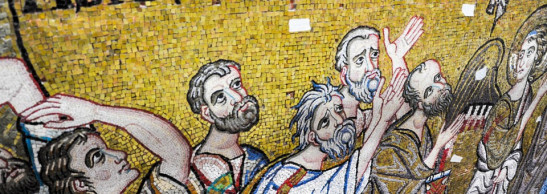Daniel Comboni
Comboni Missionaries
Institutional area
Other links
Newsletter
With the coming of Jesus in the glory of the Father has anything on earth changed? Outwardly nothing. The lives of the people continued to be what it was before: to sow, reap, trade, build homes, travel, cry and party, as usual. Even the apostles had not received any reduction on dramas and anxieties experienced by other people. However, something incredibly new happened: a new light was projected on the existence of people.
He is always beside every person
Fernando Armellini
Introduction
With the coming of Jesus in the glory of the Father has anything on earth changed? Outwardly nothing. The lives of the people continued to be what it was before: to sow, reap, trade, build homes, travel, cry and party, as usual. Even the apostles had not received any reduction on dramas and anxieties experienced by other people. However, something incredibly new happened: a new light was projected on the existence of people.
On a foggy day, the sun suddenly appears. The mountains, the sea, the fields, the trees of the forest, the scent of the flowers, the songs of the birds remain the same, but the way of seeing or perceiving them is different. It also happens to one who is enlightened by faith in Jesus ascended into heaven: he sees the world with new eyes. Everything makes sense, nothing saddens; nothing more scares.
In addition to the fatality, the miseries, the errors of persons, the Lord who builds his reign is seen. An example of this completely new perspective could be the way to consider the years of life. We all know, and maybe we smile, of octogenarians who envy those who have fewer years than themselves. They are ashamed of their age. Well, they turn their gaze to the past, not to the future. The certainty of the Ascension reverses this perspective. While the years pass, the Christian is satisfied because he sees the days of the definitive encounter with Christ coming soon. He is happy to have lived, does not envy the young ones but looks at them with tenderness.
Gospel reflection – Luke 24: 46-53
We are able to study and learn about the material things, being able to apply intelligence and perspicacity. The secrets of God instead escape us; they are inscrutable; he alone can reveal them.
If we come to Jesus, if we retrace the steps of his life guided only by human wisdom we are faced with a deep mystery. We grope in the dark. From beginning to the end, what happens is a mystery. The same mother, Mary, is surprised and amazed when God’s plan begins to be implemented in the child (Lk 2:33.50). In faith, she has to “put together,” as anchors, various events (Lk 2:19) in order to discover the puzzle of the Lord. How to grasp its meaning?
This question the Risen One answers in the first verses of today’s Gospel (vv. 46-47). He—says Luke—opened the mind of the disciples to understand the Scriptures: “Thus it is written….” The light that illuminates the events of Easter can come only from the Word of God proclaimed by the prophet. In the Bible—Jesus says—it was already foretold that the Messiah would suffer, would die and rise again.
It is hard to find such explicit statement in the Old Testament. However, there is no doubt that what has changed the minds of the disciples and made them understand that the Messiah of God was very different from what they had expected. The texts of the prophet Isaiah speak of the Servant of the Lord as “despised and rejected, a man of sorrow and familiar with grief … he will live long and see his descendants…. For the anguish he suffered, he will see the light” (Is 53:3, 10-11).
Another event—says the Risen One—is announced in Scripture: “Repentance and forgiveness in his name would be proclaimed to all the nations” (v. 47). Hence the reference to the biblical text is clear. It alludes to the mission of the Servant of the Lord: “I will make you the light of the nations that my salvation will reach to the ends of the earth” (Is 49:6).
According to the prophet, it is the duty of the Messiah to bring salvation to all nations. How will this prophecy come about if Jesus limited his activities to his people if he offered salvation only to the Israelites (Mt 15:24)?
In the second part of today’s Gospel (vv. 48-49), he answers this question: Jesus will become “light of the people” through the witness of his disciples. It is a task too superior to human capabilities. To carry out the mission of Christ good will and good quality are not enough. One needs to rely on his own strength. That is the reason for the promise: “So remain in the city until you are clothed with power from above” (v. 49).
It is the announcement of the sending of the Spirit, the One who will become the star of the age of the Church. In the Acts of the Apostles, its presence in key moments and its assistance in the decisive choices made by the disciples will be often remembered.
Luke’s Gospel ends with the story of the Ascension (vv. 50-53). Before entering the glory of the Father, Jesus blesses the disciples (v. 51). At the end of the liturgical celebrations in the temple, the priest came out of the holy place and pronounced a solemn blessing on the faithful gathered for prayer (Sir 50:20). After the blessing they returned to their jobs, confident that the Lord would bring to fruition all their efforts and all their hard work. The blessing of Jesus accompanies the community of his disciples and it is the promise and guarantee of the full success of the work, which is about to begin.
The final appeal could only be but to rejoice: the disciples “returned to Jerusalem full of joy” (v. 52). Luke is the evangelist of joy. Already on the first page of his Gospel, we read of the angel of the Lord who says to Zacharias: “He will bring joy and gladness to you, and many will rejoice at his birth” (Lk 1:14). Shortly after, in the story of Jesus’ birth, the angel again appears who says to the shepherds: “Do not be afraid. I am here to give you good news, great joy for all the people” (Lk 2:10).
The first reason why the disciples rejoice, despite not having the Master visibly present with them, is the fact that they understood that he is not, as his enemies thought, a prisoner of death.
They have had the experience of his resurrection; they are certain that he crossed first the “veil of the temple” that separated the world of people from that of God. So he showed that everything that happens on earth: successes and mishaps, injustices, suffering and even the most absurd events, such as those that have happened to him, do not escape God’s plan. If this is the destiny of every person, death no longer causes fear; Jesus transformed it into a birth to life with God. This is the first reason to deal with hope even the most dramatic and complicated situations.
The light of the Scriptures made them understand that Jesus did not go to another place, has not strayed, but remained with the people. His way of being present is no longer the same but is no less real. Before Easter, he was conditioned by all the limitations to which we are subject. Not anymore and he can be close to every person, always. With the Ascension, his presence has not diminished; it has increased! Here is the second reason for the joy of the disciples and ours.
Fernando Armellini
Italian missionary and biblical scholar
https://sundaycommentaries.wordpress.com





